The grandparent trap: how not to exploit granny daycare
With a push for grandparents to be formally paid for their time minding the grandkids, there are benefits and practicalities of Nan and Pop time.
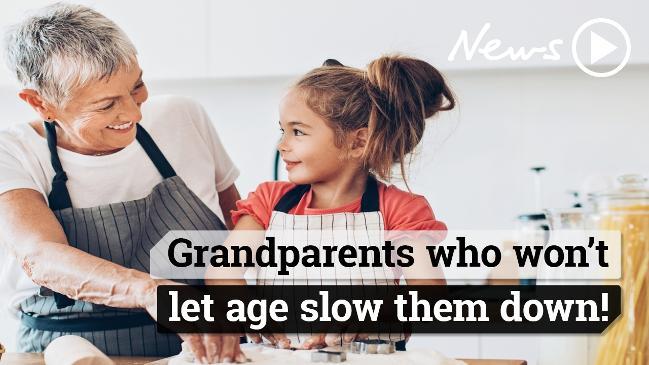
Lifestyle
Don't miss out on the headlines from Lifestyle. Followed categories will be added to My News.
Six-year-old Zoe and 74-year-old Wilfred share a special bond.
This granddaughter-grandad duo live under the same roof in Brighton and the multi-generational living arrangement suits them just fine.
“My Opi loves me very much,” Zoe says.
“I get to spend a lot of time with him and he helps me build things. Oh, and he spoils me and buys me lots of clothes.”
Does she spoil her Opi, Wilfred, back?
“Yes, I give him lots of hugs and make him artwork and cards and stuff.”
The admiration is mutual.
“This way I get to be close to my granddaughter,” Wilfred says.
“I only have one. Of course, she gets everything, but she gives me lots of love back. Watching her grow is a pleasure. She’s a beautiful little character.”
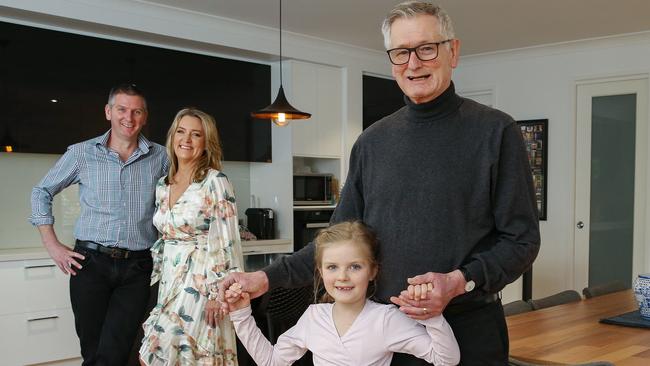
Mum in the middle Louise Kersting enjoys having three generations living under one roof.
“We decided to knock down the family home and rebuild,” she explains.
“Then we thought, ‘Wouldn’t it be nice if we built a section for my father-in-law, Wilfred, to move into?’ This way we put a roof over his head and provide him with company. On the flip side, he spends more time with Zoe. He would never get to see his granddaughter as much otherwise, given how caught up we become in our busy lives.”
There are undeniable benefits for Kersting and husband Andre, both time-poor working parents.
“Wilfred is amazing. Nothing is too much for him. Yes, we have an in-house babysitter, but we don’t like to abuse that. Wilfred loves when we ask him to help. He even picks up Zoe from ballet every Friday afternoon,” Kersting says.
Indeed, this special intergenerational babysitting bond is increasingly common.
While grandparents have always been involved in their grandchildren’s lives, what we are seeing more and more of is nanna and pop playing a pivotal role to the point families could not do without them.
In fact, grandparents are the most popular form of childcare in Australia today, providing informal care for up to one third of children of working parents, according to the Australian Bureau of Statistics.
Recent national research undertaken by the Sunday Herald Sun also found that about eight in 10 grandparents provided childcare, but only one in 100 said they were paid for their help. Eighty per cent indicated they had to forgo something in order to support their grandchildren — be it social plans, holidays or time spent with friends.
But 82 per cent said it was a labour of love and helping with childcare was a great way to spend quality time.
Graeme Sinclair, 74, is a grandfather to five grandchildren, with a sixth on the way. Once a year, he treats the oldest two — Savannah, 10, and Tyler, 7 — to a weekend ski trip.
“Just them and me,” Sinclair says. “No lessons, just ski practice with Pa. It’s a terrific way to spend quality time together.”
This Melbourne grandfather believes he can infuse the younger generation with an unusual perspective and provide them with different life lessons.
For example, iPads are banned on the drive.
“Instead we play car cricket,” he explains.
“We take it in turns to ‘bat’. Our rule is for every white car you get one run, a blue car is three, a truck is six and a red car, you’re out. Savannah won driving between Yarra Glen and Yea. Tyler won between Yea and Bonnie Doon. And between Bonnie Doon and Mansfield, well, Savannah won again.”
Does he spoil his grandkids?
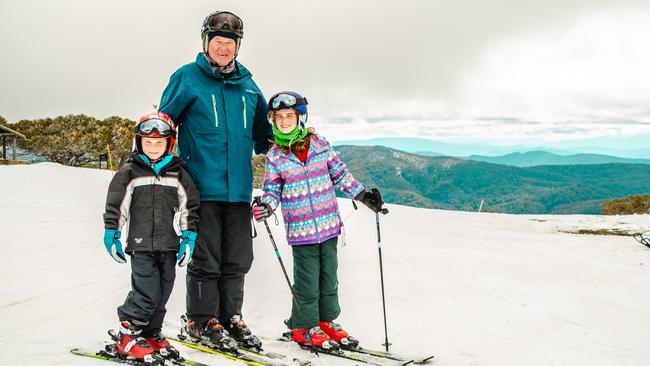
“Wouldn’t you? They know they can get away with murder with me,” Sinclair admits.
“The parents know when the kids are with us they receive treats like raspberry lemonade. And what does it matter? Parents get too uptight. Why do grandparents and grandchildren get along so well? Because they have one common enemy.”
Anne McLeish, director of Grandparents Victoria and Grandparents Australia, says this unique relationship should be cherished.
“Grandparents are more inclined to have a different play with children that enables them to get dirty and take risks,” McLeish says.
“As children hit teenage years, many are more inclined to tell their grandparents when they get into trouble because they trust them to keep their confidence, and trust them to give advice before parents find out.”
Derek McCormack, principal specialist with parenting resource Raising Children Network (raisingchildren.net.au), agrees time spent with grandparents provides a different dynamic and a terrific opportunity for everyone to learn from each other.
“Having a wide network of support — especially an adult from a different generation — helps build resilience in a child,” he says.
“There’s an opportunity to bridge that generation gap, especially when it comes to popular culture and technology.”
So, what’s caused this increase in grandma and grandpa’s roles? What are the joys of the intergenerational bond? How can “grandparent exploitation” be avoided, and should there be boundaries?
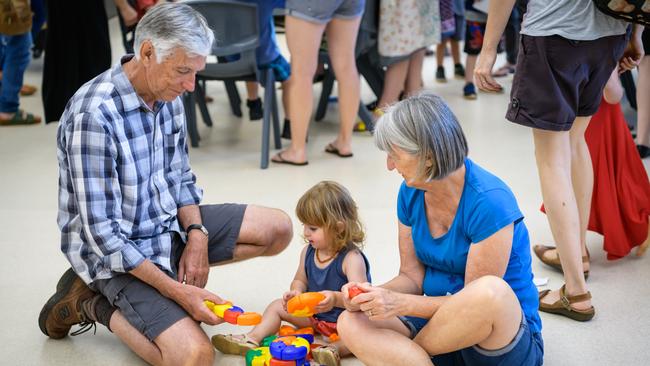
First, let’s consider the cause.
“We believe it has to do with the pressure on families these days. Look at the workforce. It takes both mum and dad to work to keep the family afloat and that brings extraordinary pressure on families,” McLeish says.
After having a baby, many women return to part-time or casual work. This means they often have lower incomes and need greater flexibility than before starting a family.
But a lack of affordable, available and flexible childcare means many working
parents rely on their own parents to fill the childcare gap.
There are, however, many wonderful benefits to this arrangement. We know that generally grandparents give unconditional love, and every child cherishes being wrapped in this.
“There are also benefits for grandparents which we’re starting to unpack now — they live longer if they play an important role, including childcare, with their grandchildren. This role goes to back to our ancestry, and is what is meant to happen — it’s in our DNA,” McLeish says.
Zoe’s grandad, Wilfred, agrees.
“The little one is so gorgeous, she keeps me young. I still work full time and run on the treadmill every night,” he says.
And Sinclair? He’s still working as an engineer, is captain of his squash team and skis like a demon.
Even so, it’s important to remember these grandfathers are septuagenarians. Childcare is physically and mentally tiring, and grandparents report exhaustion is often a big issue with minding grandkids.

“After skiing all day with the little ones, cooking their meals, showering them, dressing them in jammies and putting them to bed — it’s a big job,” Sinclair says.
There is a point where this relationship can stop being productive and becomes too much of a burden. In these instances, grandparents should articulate their discomfort.
“It’s a sensitive but important conversation to have,” McCormack says.
“If grandparents want to be involved more or less then they need to be able to say so. They should feel they can express their limitations and how much time, energy and finances they can devote to the relationship.”
Another factor to consider is retirement. Many older Australians have worked hard all their lives and are looking forward to their latter years when they have earned the time, peace and funds to indulge a little. Do they necessarily want their golden years burdened with relentless childcare — something they have endured themselves for decades? Who wants to swap a cruise for poos?
MORE LIFESTYLE READING
FIVE FAMOUS FACES ON MOMENTS THEY BECAME ADULTS
MELB VERSION OF OLD PEOPLE’S HOME FOR 4 YEAR OLDS
‘MICHELLE PAYNE EFFECT’ INSPIRES FEMALE JOCKEYS
Three things can clarify this important relationship.
First, boundaries must be set from the get-go. Have a family meeting and negotiate who does what for whom — the parents’ wishes versus the grandparents’ ability to commit. Writing it down helps clarify the roles.
Second, suggest a trial period if the gig is going to be regular. Then name a time in a month or so to discuss how it is going. Is the arrangement working out for everyone? Are the kids all right? Are nan and pop coping?
Third, parents need to remember that expectations and opportunities change over time. As a child grows older, they may be less keen to have a grandparent around. Conversely, grandparents might blossom as the kids age.
Kersting admits there were teething problems with their multi-generation living arrangement. “Wilfred was staying out of our way, but that meant he was avoiding doing the usual things in his day-to-day life,” she says.
“For example, he loves to stay fit on the treadmill in the family room but he wasn’t using it because he didn’t want to invade our space. Once we realised what was going on we moved the treadmill into his space and now he’s happy and on the treadie every night before dinner. We’re now straight up with communication and have worked out what everyone likes to do and how they wish to contribute.”
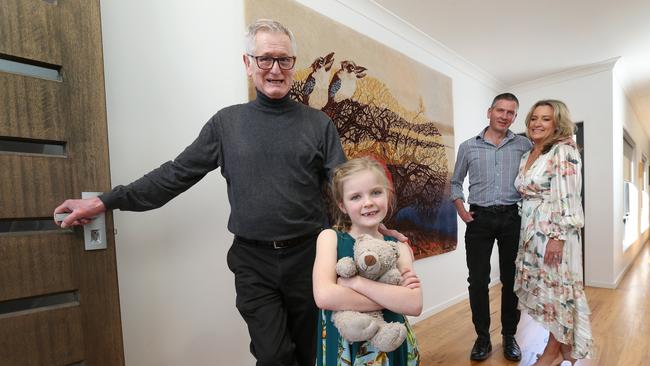
When everyone knows their role in the dynamic, it can work amazingly well.
Which brings us to the delicate issue of payment. Grandparents who are the main carers can (depending on their circumstances) benefit from government childcare assistance payments. For a grandparent to be eligible, they must look after the child for at least 65 per cent of the time. What about those who mind grandkids on a more casual basis? There is a push, driven by working families, to extend those subsidies to informal caregivers. The bonus is that such a policy could ease pension poverty, too.
Until the government steps up, the issue of paying your own parents is a personal one.
“If there is an exchange of money, again, write it down,” McLeish says.
“Be clear about rates and expectations. This can become tricky when some mums and dads pay the grandparents and others do not. Be thoughtful and careful.”
Finally, parents need to accept parenting styles have changed. In many cases, it’s not that important if the rules and rituals are a bit different. As long as there are neither safety nor health issues, it’s fine to have flexibility around rules when grandparents are in charge,” McCormack says.
And that includes ignoring the odd glass of raspberry lemonade.
“You don’t have many years left. Just relax and enjoy them,” Sinclair says.
